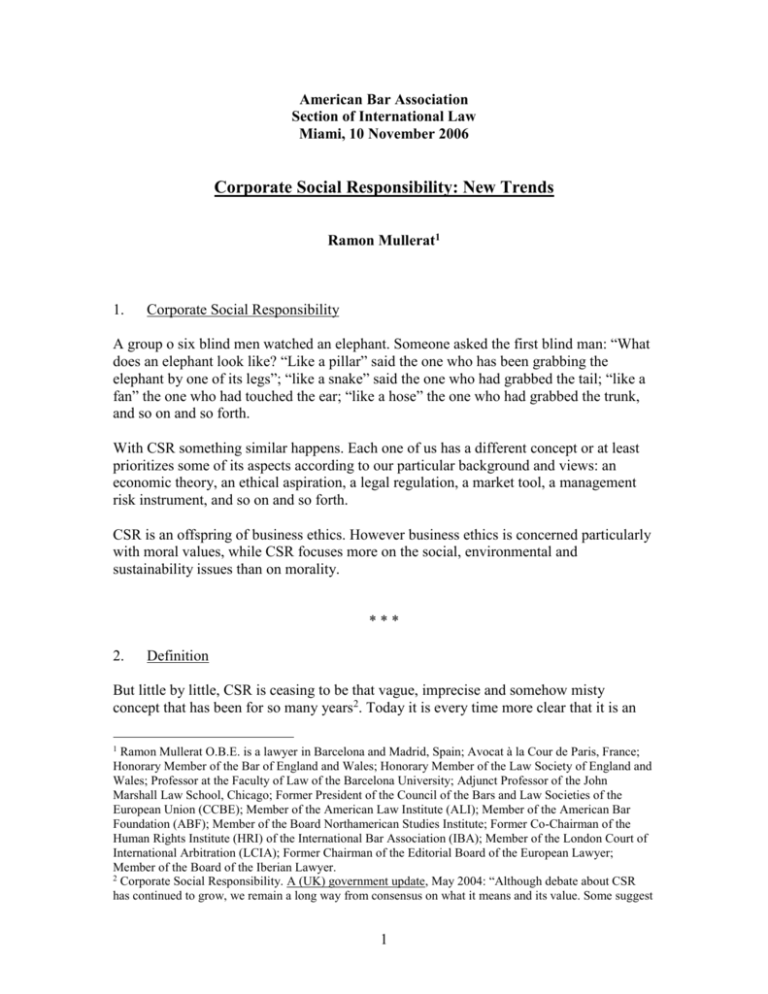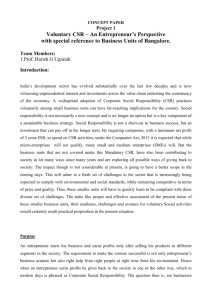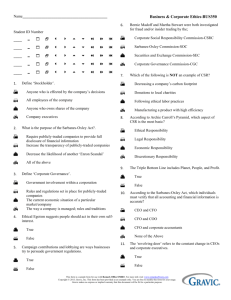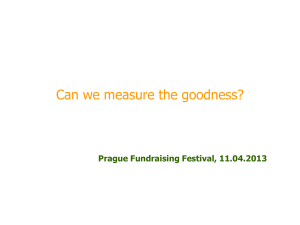CSR: New Trends - American Bar Association
advertisement

American Bar Association Section of International Law Miami, 10 November 2006 Corporate Social Responsibility: New Trends Ramon Mullerat1 1. Corporate Social Responsibility A group o six blind men watched an elephant. Someone asked the first blind man: “What does an elephant look like? “Like a pillar” said the one who has been grabbing the elephant by one of its legs”; “like a snake” said the one who had grabbed the tail; “like a fan” the one who had touched the ear; “like a hose” the one who had grabbed the trunk, and so on and so forth. With CSR something similar happens. Each one of us has a different concept or at least prioritizes some of its aspects according to our particular background and views: an economic theory, an ethical aspiration, a legal regulation, a market tool, a management risk instrument, and so on and so forth. CSR is an offspring of business ethics. However business ethics is concerned particularly with moral values, while CSR focuses more on the social, environmental and sustainability issues than on morality. *** 2. Definition But little by little, CSR is ceasing to be that vague, imprecise and somehow misty concept that has been for so many years2. Today it is every time more clear that it is an 1 Ramon Mullerat O.B.E. is a lawyer in Barcelona and Madrid, Spain; Avocat à la Cour de Paris, France; Honorary Member of the Bar of England and Wales; Honorary Member of the Law Society of England and Wales; Professor at the Faculty of Law of the Barcelona University; Adjunct Professor of the John Marshall Law School, Chicago; Former President of the Council of the Bars and Law Societies of the European Union (CCBE); Member of the American Law Institute (ALI); Member of the American Bar Foundation (ABF); Member of the Board Northamerican Studies Institute; Former Co-Chairman of the Human Rights Institute (HRI) of the International Bar Association (IBA); Member of the London Court of International Arbitration (LCIA); Former Chairman of the Editorial Board of the European Lawyer; Member of the Board of the Iberian Lawyer. 2 Corporate Social Responsibility. A (UK) government update, May 2004: “Although debate about CSR has continued to grow, we remain a long way from consensus on what it means and its value. Some suggest 1 entrepreneurial activity, which, in addition to making profits, looks to promote with the interests of the stakeholders and the community, thus showing that corporations have a soul and acting as a good citizen. As the ICC says: CSR is a voluntary commitment by business to manage their roles in society in a responsible way” *** 3. New trends In addition to be more precisely defined, the CSR movement is evolving following some trends that I intend to describe briefly, in ten bullet points this morning: First, there are no more a few companies, which have consecrated themselves to this new doctrine, but the majority of large enterprises have introduced it in their agenda. Philip Kotler and Nancy Lee in their book “Corporate Social Responsibility”3 indicate that charitable giving has risen from $9.6 b in 1999 to $12, 19 b. In spite of some opponents like the survey in The Economist last year which maintains that CSR is eroding the basis of the free enterprise system, every time more this new doctrine is catching the attention of business people4. Second, since the term “triple bottom line” (people, planet and profit) was carried in 1994, an accelerating progression from early concerns about safety, health and environment to a growing range of social concerns have been seen, among them human rights and diversity. Recently other concerns like fair trade pricing and fair wages as well as socially increasingly have increasingly made headlines 5. There is an increasing conviction that there is not a conflict but a positive correlation between CSR and profitability and that profits can go hand-in-hand with social and environmental responsibility6. that it is just about glossy reports and public relations. Some see it as a source of business opportunity and improved competitiveness. Some see it as no more than sound business practice. Others see it as a distraction or threat. Is it a framework for across the board regulative of all of the relationships between the business and the rest of society, nationally and globally? Is it just about the activities of North American and European multinationals in developing countries? Is it relevant and useful to companies of all sages no matter where they are based and operate? Lively debate will continue on these and many other questions. 3 Philip Kotler and Nancy Lee, Corporate Social Responsibility, Wiley, 2005. 4 In addition, governments have made many new commitments after the World Summit on Sustainable Development in Johannesburg in 2002, like the Millenium Development Goals, the World summit on the Information Society (2003), the Extractive Industries Transparency, the Equator Principles, the SIGMA project, the EU Commission White Paper 2004, the Multistakeholder Forum, the European Alliance on CSR. 5 John Elkington and Mark Lee, “It’s Economics, Stupid” Grist, Environmental News and Commentary, 9 May 2006. 6 According to recent global surveys by PwC, nearly 70% of CEOs of companies relieve that sustainability is vital for their profitability and 2/3 say it will remain a high priority. Financial Times, 26 October 2006. 2 Third, the social responsible enterprises every time more publish their activities for their shareholders and the public in general, either in their general annual report or in CSR specific reports. According to a survey of KPMG in 2002, 45% of co portions issued environmental, social or sustainability reports compared with 35% in their 1999 survey. Greater transparency is a means to improve accountability and trust. Fourth, CSR has ceased to be a form of philanthropy so that it is no more the case to sign a check at the end of each financial year, after a positive result - and CSR enters into the normal activities of the corporation before declaring its profits and becoming a all year around responsibility. It is a shift to making long-term commitments to especial social issues providing more than cash contributions, sourcing funds from business units as well as philanthropic budgets, forming strategic alliances, etc. CSR is becoming as much as anything a way of thinking about and doing business. Corporate investment decisions driven by quarterly profit earnings are short-sighted and sacrifice long-term wealth creation. Fifth, it is no longer the owner or the CEO the one which decides to write the check, but it is the collective commitment of all the corporation from the CEO until the last employee; it is precisely the employees’ satisfaction one of the objectives of CSR. There is an increasing awareness of CSR among the workforce. Sixth, before a social activity generally dissociated from the cooperation, the trend is that the activity be totally related with the core business of the cooperation, its products or services (for instance when an electronic corporation decides to train the students of a school on the use of computers). Seventh, the establishment of a social norm to do good. As William Clay Ford Ford Motor Company CEO “there is a difference between a good company and a great company. A good company offers excellent products ands services. A great company also offers excellent products and services but also thrives to make the world a better place”. From the philosophy of “doing good to look good”, to the conviction of “doing well and doing good”. Eighth, it is clear today that CSR’s success requires the decisive cooperation of the government and business in a strong symbiosis. This is particularly clear in developing countries. As the World Summit on Sustainable Development (Johannesburg 2000) recognized, partnership between business, government and civil society is the key to the progress we need on sustainable development. Ninth, every time sectoral projects on CSR are materializing like in the mining industry, the energy industry or the apparel industry, for example, the Multi-fibre Arrangement Forum, or like the Equator Principles where a group of large financial institution decided to impose conditions particularly environmental conditions to their clients’ projects. Ten. Up to now CSR has been something voluntary (voluntary to adopt and voluntary to comply with). Today there is a big debate where CSR should remain voluntary or should 3 become compulsory. Many believe for example that the limitation off the CO2 in the atmosphere emissions will not stop voluntary unless it becomes a legal duty. *** 4. The UN Norms One of the ignition factors for this debate is the project of the UN to adopt Norms on the Responsibility of Transnational Corporations and other enterprises with regard to Human Rights. This project is being road-tested at present. If the Norms were to adopted, they would become the first legally compulsory text, which would impose human rights legally binding obligations, not only to states, it is clear from the Human rights instruments, but also to corporations, so that any victim from the violations of such right should sue the violating corporation in the courts of justice and receive economic compensation. But in my view it is a false dilemma. In CSR voluntary and compulsory activities can cohabitate and intertwine themselves. The fact that humans rights respect would become a hard law obligation for corporations does not mean that corporation could continue benefiting the stakeholders and the community with their voluntary social actions. Mandatory and voluntary approaches are compatible and the main focus on CSR should continue to be a voluntary one7. *** 5. Conclusion Finally, I would like to enhance the importance of the role of the legal profession in CSR, as a service for the public good as “the higher calling of the profession” namely the obligation of lawyers to become involved in the overriding concerns of society *** CSR is here to stay and perfectly complements the modern corporate governance doctrine. Today’s enterprises are perfectly conscious of their power and influence and therefore of there responsibility to make the world better. *** Peter Sutherland, “Explaining responsibility and complicity”, the 2005 Business and Human Rights Seminar Report 2005: “[Mandatory and voluntary approaches] this is not an either-or situation. The world has mandatory laws and regulations, and also voluntary codes and standards. They co-exist, but they perform different roles. Mandatory approaches focus on setting minimum standards, while voluntary codes focus on raising the bar. Progressive business fully support mandatory approaches provided that they are reasonable and anti-competitive, because they create a level playing field and prevent abuses” 7 4 7. A story Let me finish with a story The Earth Summit in Rio de Janeiro in 1992 invited Severn Suzuki, a 12-year old who started the Environment Children Organization in 1989, to address a full plenary session, which was full of high-ranking and powerful businessmen. She said to them: “you teach us how to behave in the world. You teach us not to fight with others; to work things out; to respect others; to clean up our mess; not to hurt other creatures; to share and not to be greedy. Then why you go out and do the things you tell us not to do? 5







